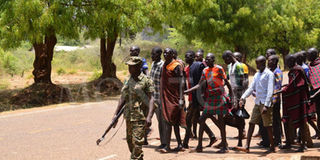Two confess to killing three geologists, two UPDF soldiers in Moroto - police

The suspects who were rounded up following the killing of the geaologists being led to the UPDF cells in Moroto District. Two of the 20 suspects have reportedly confesed to killing the three geologists and their two military escorts on March 21, 2022. Photo/Steven Ariong
What you need to know:
- The suspects are currently detained at the UPDF 3rd division headquarters where they are likely to appear before the army court on charges of murder, illegal possession of firearms and illegal entry into Uganda, among others.
Some 170 illegal guns and more than 15,000 stolen cattle have been recovered since July last year, according to government figures.
At least 251 suspected cattle rustlers were killed last year in the sub-region by a joint force of police and the army, with most deaths attributed to forceful disarmament operations.
Police’s Anti Stock Theft Unit (ASTU) and Uganda People’s Defence Forces (UPDF) have arrested two key suspects in the killing of three geologists and two soldiers in Moroto District last month.
Three officials, including one of the country's top geologists, and their two military escorts were on March 21 killed in a remote, mineral-rich region bordering South Sudan and Kenya.
They came under attack during a mineral mapping exercise in Karamoja, an impoverished and volatile region in the country's northeast.
Richard Kiggwwe, the lead geologist and his colleague, Charles Olweny-- both from the mineral and energy ministry -- had travelled 490 kilometres (300 miles) from the capital Kampala to Moroto District alongside an intern identified as Edna Musiime from Makerere University.
Their translator reportedly tried to explain to the armed warriors about their mission in the area but the warriors, probably out of lack of information opened fire, killing all the five in cold blood. The translator escaped with an injury on the stomach.
Security operatives said 20 people were rounded up in a one-week operation in Lokisilei, Kobebe dam and parts of Naput in Lotisan Sub County following the attack.
Two of the suspects confessed to killing the geologists, according to police.
Mr Micheal Longole, the Karamoja regional police spokesperson said: "I’m glad to say two of the prime suspects in the killing of three geologists have so far been arrested and they confessed."
He said the suspects are currently detained at the UPDF 3rd division headquarters where they are likely to appear before the army court on charges of murder, illegal possession of firearms and illegal entry into Uganda, among others.
Mr Longole said the security operatives also recovered eight guns, three rounds of ammunition and one police uniform during the operation.
However, the two guns stolen from the military escorts who were killed alongside the geologists are yet to be recovered.
Mr Francis Kiyonga, the former Amudat District chairperson said security situation in the region would not have deteriorated if the government forces on the ground were working with the local leaders.
"Addressing the security situation in Karamoja does not need to work in isolation but as a team," he said.
Karamoja -- a sparsely populated and underdeveloped region -- has been wracked for decades by insecurity due to tit-for-tat armed cattle raids between clans.
With a porous border and thriving illicit trade, the Karimojong nomadic communities have staged several often-fatal road ambushes and robberies in the lawless region.
President Museveni’s son and the commander of land forces, Gen Muhoozi Kainerugaba, on last month vowed retribution over the geologists attack.
"My Karimojong brothers! We have begged you to stop the life of robbery and violence. We have begged you to stop attacking your neighbours at no avail," Kainerugaba said on Twitter on March 23.
"Well, now we are coming, and hell is coming with us."
The government has in the past conducted several security operations to retrieve illegal firearms from the community.
Some 170 illegal guns and more than 15,000 stolen cattle have been recovered since July last year, according to government figures.
At least 251 suspected cattle rustlers were killed last year in the sub-region by a joint force of police and the army, with most deaths attributed to forceful disarmament operations.
DON'T MISS: We're coming with hell, Muhoozi tells rustlers




